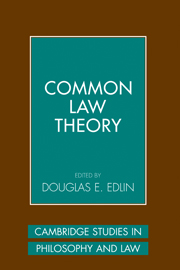1 - Judges as Rule Makers
Published online by Cambridge University Press: 17 September 2009
Summary
The sources of law recognized by common law courts are generally understood to include not only legislation and constitutions but also prior judicial decisions. Lawyers rely on judicial precedents in advising clients, and courts cite precedents in their opinions. Yet exactly what courts do, or should do, with precedents is a surprisingly complex problem.
In this chapter, we outline competing views of the proper role of precedent in judicial decision making and defend one such view. Our position is that, subject to certain qualifications, courts can best serve the ends of the legal system by treating rules announced in past cases as binding. In other words, courts should apply previously announced rules to present cases that fall within the rules' terms even when the courts' own best judgment, all things considered, points to a different result.
In defending this approach to precedent rules, we adopt the point of view of an imaginary authority designing a legal system. We assume that the subjects of this legal system share a set of general aims and moral values but do not always agree on what these aims and values require in particular settings. Accordingly, the dominant end of the legal system, and the reason why its subjects have enlisted our imaginary authority to design it, is to settle peacefully and correctly the controversies that arise over how best to carry out shared aims and values in the course of daily life.
- Type
- Chapter
- Information
- Common Law Theory , pp. 27 - 50Publisher: Cambridge University PressPrint publication year: 2007
- 7
- Cited by

